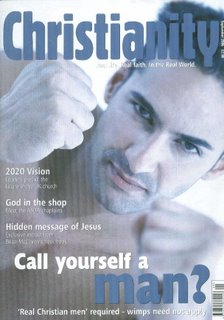 My church recently completed its lent studies of Rick Warren’s book “The Purpose Driven Life”. In spite of the occasional lapse into a “just so” spirituality and quip theology, I was, in the main, left with a very favorable impression of this book. If there is a single word that encapsulates my reasons for this, that word is “Inclusiveness”. Let me explain.
My church recently completed its lent studies of Rick Warren’s book “The Purpose Driven Life”. In spite of the occasional lapse into a “just so” spirituality and quip theology, I was, in the main, left with a very favorable impression of this book. If there is a single word that encapsulates my reasons for this, that word is “Inclusiveness”. Let me explain.I have to confess that there has been and still is much mutual discomfort, sometimes bordering on deep repugnance, between evangelical Christianity and myself. Looking back that tension started the day I was converted. There were and are many reasons for this, but one major of cause of this conflict is encapsulated in one word “Exclusiveness”. Rick Warren’s inclusiveness implicitly undermines this exclusiveness and yet he does not stray beyond the traditional doctrinal shape of Christianity.
I can find many examples of Warren’s stealth attack on Christian exclusivism: Here are some examples:
“The most common mistake in worship is seeking an experience rather than seeking God” (P109). “Too many equate being emotionally moved by music as being moved by the Spirit” (P102). “There is no one size fits all approach to worship .... you don’t bring glory to God by trying to be someone he never intended you to be” (P103). “God made introverts and extroverts. He made some people love routine and those who love variety. He made some people thinkers and others feelers. Some people work best when given an individual assignment while others work better with a team” (P245). “Because God loves variety and he wants us to be special, no single gift is given to everyone. Also, no individual receives all the gifts” (P236). “There are no definitions of spiritual gifts given in the Bible, so any definitions are arbitrary and usually represent a denominational bias.” P250. “The Bible is filled with examples of different abilities that God uses for His glory” (P242).
The latter half of the twentieth century witnessed the intellectual impoverishment of large sections of the church. Unable to make sense of the ascendancy of science and reason there was a great Christian escape into various forms of gnostic enlightenment, and this was especially manifest amongst charismatic fellowships. Gnosticism is a general religious phenomenon found in other religions and it is not specifically Christian. Consequently, it skews the personality demographics of churches.
On the other hand Warren’s approach is a much-needed antidote to the spiritual elitism, exclusivism, fideism and authoritarianism that has wracked parts of charismatic Christianity, and in all probability continues to do so today. Warren’s book subtly subverts gnosto-christianity; How is it that Warren can talk about spiritual gifts without any reference to ‘charismatic initiation’? How can he accept that Christians can be filled with the Spirit without speaking in tongues? Should he allow thinking Christians to ‘be in the Spirit’ without embracing some form of fideism? Warren’s vision of the church, as far as I can tell, is big enough to include a variety of personalities types, spiritual gifting, experience, traits and styles. However, many Christains have a high tolerance of inconsistency and incoherence and they achieve this by ignoring or not seeing cognitive anomalies, and so Warren’s book is unlikely to register as a challenge to the gnosto-christian status quo.




 O'Gobstopper's book:Starting (and finishing) with a blank sheet.
O'Gobstopper's book:Starting (and finishing) with a blank sheet.





